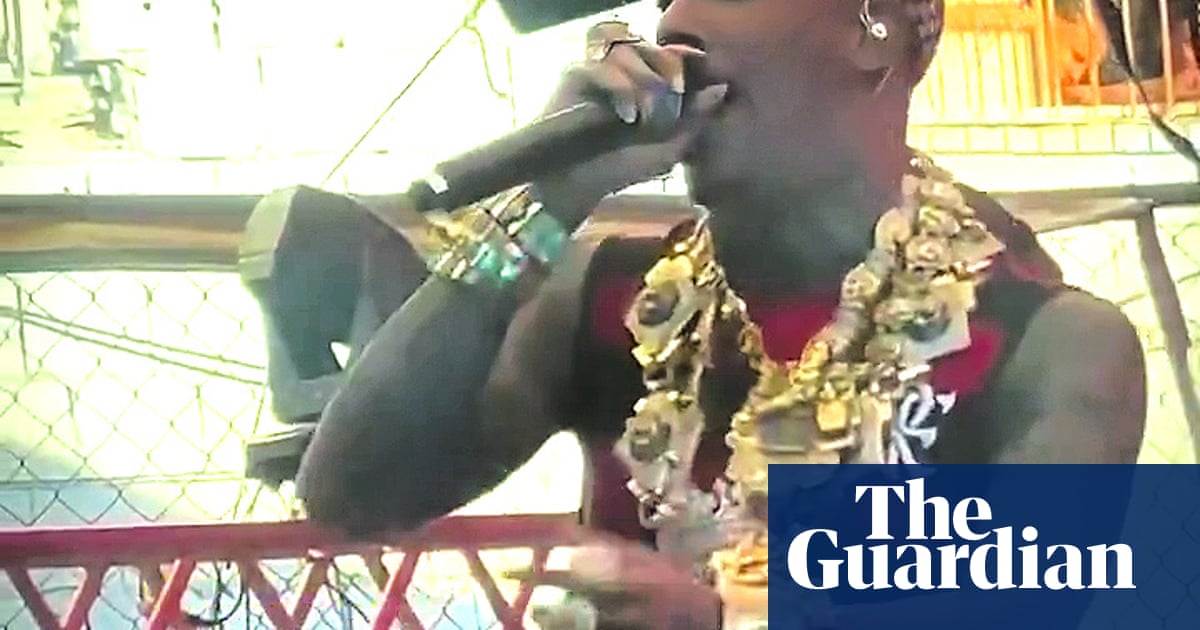The arrest of a well-known Brazilian funk singer on charges of allegedly inciting crime in his lyrics and an alleged connection to a major criminal gang has sparked outrage among artists, intellectuals and legal experts.
MC Poze do Rodo, 26, who has 5.8 million monthly listeners on Spotify, wasarrested early on Thursday at his homein a luxury condominium in Rio de Janeiro’s west zone.
Outcry has focused on the way the artist was detained over alleged non-violent offences: handcuffed, shirtless and barefoot.Footage of the arrestwas broadcast repeatedly on television and splashed across the front pages of Brazilian newspapers.
“This is persecution [against me],” the funk singer told journalists as he was transferred from the police station to jail. “There is no evidence.”
Activists say the case is the latest example of thecriminalisation of funk music– and, by extension, of Black culture; something researchers argue has been a systemic feature of Brazilian society since the abolition of slavery in 1888.
Like most Brazilian funk artists, MC Poze – born Marlon Brendon Coelho Couto da Silva – is Black and raised in afavela.
He rose to prominence in 2019 and has since succeeded with songs depicting daily life in those communities, including some tracks that openly reference drug trafficking.
In an interview with TV Globo last year, he admitted that as a teenager,he had worked for the drug trade: “I’ve been in shootouts, I was shot, and I was arrested too.” But he insisted he had left that life behind and that his goal was to send young people the message that “crime doesn’t lead anywhere”.
Last Thursday, police justified his arrest by claiming he was “clearly glorifying drug trafficking and the illegal use of firearms” in his lyrics, and that his concerts were being financed by one of Brazil’s two main criminal gangs,the Comando Vermelho (Red Command).
The police chief, Felipe Curi, even claimed that MC Poze’s lyrics were “often far more damagingthan a rifle shot fired by a drug trafficker”.
According to Pierpaolo Cruz Bottini, professor of criminal law at the University of São Paulo, there is no incitement to crime in MC Poze’s songs. “There is no intent to promote or defend criminal acts – rather, the songs paint a vivid picture of a reality everyone is already aware of.”
Bottini said that the way the singer was detained – without being allowed to get dressed or even put on shoes – was “completely inappropriate”.
“Even in cases of violent crimes, such treatment would only be justified if there were signs of resistance or a risk of flight – and that clearly wasn’t the case,” he said.
After the arrest, other funk artists took to social media to protest in solidarity. Another high-profile singer, MC Cabelinho,pointed outthat when an actor in soap opera or a film portrays a character involved in drug trafficking, it is not seen as inciting crime.
According to anthropologist Mylene Mizrahi, a professor at Rio’s PUC university, funk artists are still not considered legitimate artists.
“They are pop artists, just like US rappers or Hollywood film-makers. But when someone like Martin Scorsese makes a mafia film, they’re not branded mobsters,” she said.
The lawyer Joel Luiz Costa, executive director of the Black Population Defence Institute, said: “The criminalisation of funk is part of a long historical process that began after the abolition of slavery and previously targetedsamba,capoeiraand afro-Brazilian religions.
“There’s a clear pattern of criminalising Black culture,” he added. “Since they can’t just outlaw being Black, they target something associated with the Black community.”
